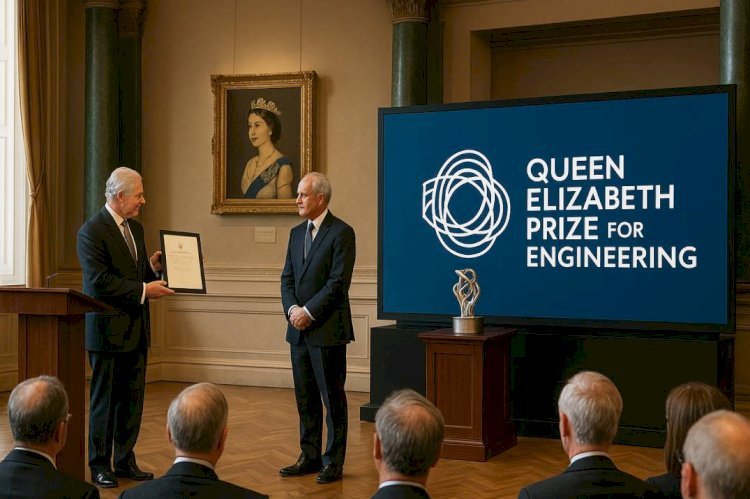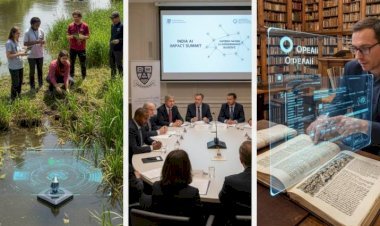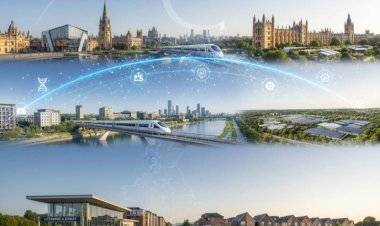Seven Machine Learning Pioneers Win 2025 Queen Elizabeth Prize for Engineering
Seven pioneers of machine learning have been awarded the 2025 Queen Elizabeth Prize for Engineering, recognising innovations shaping modern AI.

London, November 5, 2025 — Seven engineers whose innovations underlie the rise of modern artificial intelligence have been awarded the 2025 Queen Elizabeth Prize for Engineering (QEPrize), one of the world’s most prestigious honours in engineering. At a ceremony held at the Science Museum in London, these pioneering individuals were celebrated for breakthroughs that have enabled machines to learn from data at scale — transforming industries and improving lives worldwide.
Ceremony Celebrates Global Impact of Modern Machine Learning
The Queen Elizabeth Prize for Engineering has long recognized individuals whose work addresses worldwide challenges. In 2025, the spotlight was firmly on pioneers of modern machine learning—a discipline underpinning today’s advances in artificial intelligence, data science, and deep learning technologies. This year’s laureates include Yoshua Bengio, Geoffrey Hinton, John Hopfield, Yann LeCun, Jensen Huang, Bill Dally, and Fei-Fei Li. Collectively, their breakthroughs have unlocked possibilities across countless sectors, shifting paradigms in how society leverages technology.
The Laureates: Visionaries Behind Transformative AI
The seven laureates of the 2025 prize are: Yoshua Bengio, Geoffrey Hinton, John Hopfield, Yann LeCun, Jensen Huang, Bill Dally, and Fei-Fei Li.
-
Bengio, Hinton, Hopfield, and LeCun are widely recognised as the architects of neural-network research; their foundational work established artificial neural networks as the dominant paradigm in machine learning.
-
Jensen Huang and Bill Dally spearheaded the development of hardware platforms—particularly GPUs and related architectures—that made deep learning computationally practical and globally scalable.
-
Fei-Fei Li’s creation of the ImageNet dataset provided one of the first large-scale image libraries for training and benchmarking computer-vision algorithms, fundamentally advancing that field.
Together, their contributions span the full chain—from algorithms to hardware to data—that underpins modern AI systems.
Engineering’s Three Pillars: Algorithms, Hardware, and Data
The achievements recognised by the 2025 QEPrize rest on three interlocking pillars:
-
Algorithmic innovation: The laureates transformed how machines learn, generalise, and adapt by advancing neural-network theory and architectures.
-
Hardware acceleration: GPUs and specialised computing architectures developed under Huang and Dally enabled the training of large-scale deep-learning models, powering AI’s global growth.
-
Data resources: Progress in AI depends not only on theory and computation but also on access to rich, labelled datasets. ImageNet, created by Fei-Fei Li, remains a cornerstone of computer-vision research.
Together, these pillars have made it possible to apply machine learning across critical sectors—from healthcare and energy to transportation and education—demonstrating engineering’s power to benefit humanity.
Engineering Innovation That Matters
Artificial intelligence powered by machine learning now shapes modern society—from healthcare imaging and renewable energy to speech recognition and financial forecasting. The laureates’ contributions have enabled machines to discover patterns, automate complex decisions, and support global innovation. As Lord Vallance, Chair of the Queen Elizabeth Prize for Engineering Foundation, noted at the ceremony, “Their work exemplifies the power of collaboration and stands as an inspiration to engineers everywhere.”
Professor Dame Lynn Gladden, chair of the judging panel, added, “This year’s winning innovation impacts everyone, yet the full extent of its engineering remains largely unrecognized, making it an especially exciting choice.”
Prize Details and Broader Significance
The seven laureates will share the £500,000 prize and receive a unique trophy designed by Prerak Bothra, winner of this year’s “Create the Trophy” competition. Since its inception in 2013, the Queen Elizabeth Prize for Engineering has honored 26 engineers whose innovations have improved billions of lives.
Judges praised this year’s recipients for enabling transformative breakthroughs in artificial intelligence, advancing critical sectors such as:
-
Healthcare (rapid disease detection)
-
Transportation (autonomous driving systems)
-
Energy (smart grid optimization)
-
Education (AI-powered personalized learning)
Inspiration for Future Generations
This year’s ceremony was attended by HRH The Princess Royal and other leaders from the engineering and scientific community. The event highlighted the accomplishments of the laureates and the broader mission of engineering: inspiring future generations to solve humanity’s greatest challenges.
The Science Museum’s vivid setting provided a fitting reminder of the infinite cycle of innovation—each breakthrough builds on the last, fueling progress that touches every aspect of daily life. Young engineers and students were encouraged to follow in the laureates’ footsteps, continuing the legacy of ingenuity and creativity at the heart of modern technology.
Looking Forward
With artificial intelligence poised to play an even greater role in society, the Queen Elizabeth Prize for Engineering continues to champion bold, collaborative inventiveness demonstrated by this year’s winners. The foundation eagerly anticipates future nominations that will shape how we live, work, and interact.
About thetechnews.co.uk
thetechnews.co.uk delivers incisive coverage and analysis of technology, engineering, and artificial intelligence breakthroughs. Serving the UK’s tech-savvy audience, we blend expert reporting, insightful commentary, and in-depth features to keep readers informed about innovations transforming our world. Whether you’re a STEM professional, entrepreneur, or enthusiast, thetechnews.co.uk connects you with stories and trends driving our technological future.
Frequently Asked Questions (FAQs)
Q1: What is the Queen Elizabeth Prize for Engineering?
The Queen Elizabeth Prize for Engineering (QEPrize) is a prestigious global award recognizing groundbreaking engineering innovations that have benefited humanity. It celebrates engineering visionaries and inspires future generations.
Q2: Who won the 2025 Queen Elizabeth Prize for Engineering?
The 2025 prize was awarded to seven pioneers of modern machine learning: Yoshua Bengio, Geoffrey Hinton, John Hopfield, Yann LeCun, Jensen Huang, Bill Dally, and Fei-Fei Li, recognized for neural networks, hardware platforms, and datasets like ImageNet.
Q3: Where was the 2025 Queen Elizabeth Prize for Engineering ceremony held?
The award ceremony took place at the Science Museum in London, with King Charles presenting the prize.
Q4: What innovations did the 2025 winners contribute to?
They advanced modern machine learning by developing neural network algorithms, scalable AI hardware, and foundational datasets essential for training AI systems, revolutionizing healthcare, transportation, and energy industries.
Q5: How much is the prize money for the Queen Elizabeth Prize for Engineering?
The 2025 winners share a total prize of £500,000 awarded by the QEPrize Foundation.
Q6: How often is the Queen Elizabeth Prize for Engineering awarded?
Initially biennial, the prize has been awarded annually since 2021, reflecting rapid advancements in transformative engineering innovations.
Q7: Who can be nominated for the Queen Elizabeth Prize for Engineering?
Living individuals or teams responsible for groundbreaking engineering advances can be nominated by organizations and peers; self-nomination is not allowed.
Q8: What industries benefit from the innovations recognized by the 2025 QEPrize?
Innovations impact healthcare (AI diagnosis), autonomous vehicles, renewable energy, education, and many other sectors, demonstrating engineering’s role in shaping modern life.
Q9: Where can I learn more about the Queen Elizabeth Prize for Engineering?
Official information is available on the QEPrize website and through announcements by organizations like the Royal Academy of Engineering.

 AnniWeston
AnniWeston 















